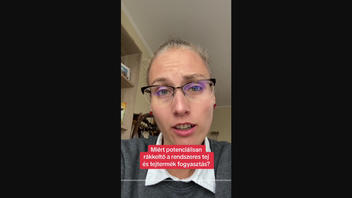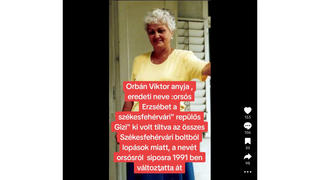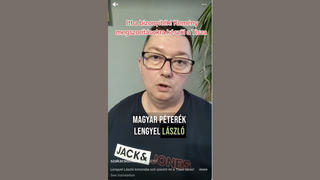
Can the regular consumption of cow's milk lead to cancer? No, that's not true: No conclusive evidence exists that establishs a direct link between cow's milk or its casein content -- the main protein in milk -- and cancer development. Milk is considered a component of a healthy diet.
The claim appeared in a TikTok video (archived here) where it was published by Mónika Hoffmann on October 16, 2023, under the title (translated from Hungarian to English by Lead Stories staff):
Why regular milk and dairy product consumption can potentially cause cancer.
This is what the post looked like on TikTok at the time of writing:

(Source: TikTok screenshot taken on Thu Oct 19 14:30:03 2023 UTC)
In her video, the TikTok user lists various types of tumors that she alleges are associated with the consumption of cow's milk (translated from Hungarian to English by Lead Stories staff):
Hungary is (hurray) leading in the number of cases of digestive system and intestinal cancer. But we can add lung cancer, bladder cancer, brain tumor, breast cancer and tumors of male and female parts. Is it really worth it to drink the milk of that unfortunate cow?
The Hungarian Semmelweiss University of Medicine and Health Sciences has refuted these claims. On the contrary, Hungary's pre-eminent health care university recommends the regular consumption of milk and dairy products to lower the risk of tumors in the digestive system, particularly colon cancer.
According to Cancer Research UK, the consumption of milk and dairy products can lower the risk of developing bowel cancer. However, there is no conclusive evidence to suggest that it either increases or decreases the risk of any other types of cancer. The World Health Organization (WHO) and NHS Eat Well Guide also recommend incorporating milk and dairy products into your regular diet to promote a healthy and balanced lifestyle.
Lead Stories has previously debunked the claim that milk casein is carcinogenic. It has not been classified as a carcinogen by either the International Agency for Research on Cancer or the U.S. National Toxicology Program. Cancer.org says these two organizations independently maintain registries of recognized cancer-causing agents.
However, according to Oxford University, research conducted by Oxford Population Health, Peking University and the Chinese Academy of Medical Sciences in Beijing has revealed that dairy products increase cancer risks for the Chinese population. Over four years, a study involving 510,000 individuals found that regular consumption of dairy products was associated with notably higher risks of liver and breast cancer among the study participants. Specifically, for each additional 50 grams/day of dairy intake, the risk increased by 12 percent for liver cancer and 17 percent for breast cancer. Oxford contextualizes this finding by stating that China has far lower consumption of milk, cheese, butter and yogurt than Western populations and that "most Chinese adults cannot properly metabolise dairy products due to lack of lactase, a key enzyme for breaking down the milk sugar lactose."















